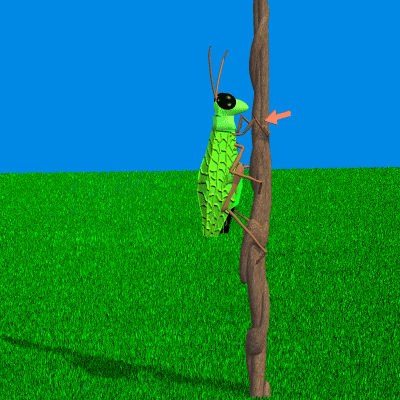Thursday, July 03, 2014
See what happens when you LISTEN?
This will go unnoticed by the BIG-money BIG-insanity wackos who run physics and "global warming".
It should be noticed by all lovers of science and Nature. It should be trumpeted across the world.
This is the BIGGEST discovery of the decade, and it's an elegant experiment as well. [Plus a bonus aptronym.]
 We already know that insects can read the vibrations and calls of other insects through the stems of plants. Now we know that the plants are not just acting as 'telephones' in this process; they're also listening in on the line. Bugging the bugs.
Absolutely amazing. I'm glad I lived to see this.
= = = = =
Bit later: Just realized that the Rex Cocroft who worked on this project is the same Rex Cocroft who recorded those wonderful leafhopper sounds. So the connection between studying insect communication and studying plant hearing is not coincidental; it's clearly part of a larger research plan.
We already know that insects can read the vibrations and calls of other insects through the stems of plants. Now we know that the plants are not just acting as 'telephones' in this process; they're also listening in on the line. Bugging the bugs.
Absolutely amazing. I'm glad I lived to see this.
= = = = =
Bit later: Just realized that the Rex Cocroft who worked on this project is the same Rex Cocroft who recorded those wonderful leafhopper sounds. So the connection between studying insect communication and studying plant hearing is not coincidental; it's clearly part of a larger research plan.
"Previous research has investigated how plants respond to acoustic energy, including music," said Heidi Appel, [at Univ of Missouri]. "However, our work is the first example of how plants respond to an ecologically relevant vibration. We found that feeding vibrations signal changes in the plant cells' metabolism, creating more defensive chemicals that can repel attacks from caterpillars." In the study, caterpillars were placed on Arabidopsis, a small flowering plant related to cabbage and mustard. Using a laser and a tiny piece of reflective material on the leaf of the plant, Cocroft was able to measure the movement of the leaf in response to the chewing caterpillar. Cocroft and Appel then played back recordings of caterpillar feeding vibrations to one set of plants, but played back [silence or other vibrations] to other plants. When caterpillars later fed on both sets of plants, the researchers found that the plants previously exposed to feeding vibrations produced more mustard oils, a chemical that is unappealing to many caterpillars.In simple terms, PLANTS GOT BRAINS. Plants are able to distinguish between precise patterns of sound. This is WAY more than simply spotting the existence of vibrations or detecting a touch. This requires sequential memory, a cochlea (or something analogous), and a template comparator. Where are these mechanisms? Completely unknown at the moment. Can this be done with epigenetic switching, like some other plant senses? Seems dubious.
 We already know that insects can read the vibrations and calls of other insects through the stems of plants. Now we know that the plants are not just acting as 'telephones' in this process; they're also listening in on the line. Bugging the bugs.
Absolutely amazing. I'm glad I lived to see this.
= = = = =
Bit later: Just realized that the Rex Cocroft who worked on this project is the same Rex Cocroft who recorded those wonderful leafhopper sounds. So the connection between studying insect communication and studying plant hearing is not coincidental; it's clearly part of a larger research plan.
We already know that insects can read the vibrations and calls of other insects through the stems of plants. Now we know that the plants are not just acting as 'telephones' in this process; they're also listening in on the line. Bugging the bugs.
Absolutely amazing. I'm glad I lived to see this.
= = = = =
Bit later: Just realized that the Rex Cocroft who worked on this project is the same Rex Cocroft who recorded those wonderful leafhopper sounds. So the connection between studying insect communication and studying plant hearing is not coincidental; it's clearly part of a larger research plan.Labels: Aptronym Alert, Smarty-plants
